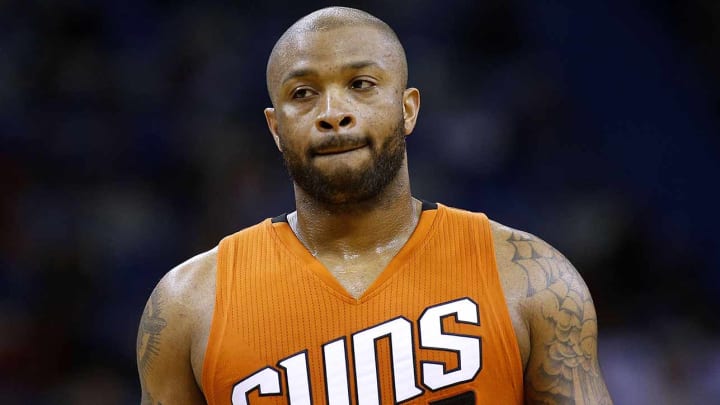Trade Grades: Raptors Fortify Roster With P.J. Tucker Before The Deadline

After months of shopping around their extraneous veterans, the Suns finally found an eager trade partner—if not one quite so eager to surrender the first-round pick they were chasing. Phoenix traded P.J. Tucker to Toronto on Thursday in exchange for Jared Sullinger and a pair of second-round picks, according to Yahoo! Sports.
Who won the deal? Let’s grade the trade.
Suns: B-
The final months of Tucker’s contract—originally signed for $16.5 million over three years back in 2014—will be spent playing games of consequence. Phoenix is one of the few teams in the Western Conference without any conceivable hope of playing for the eighth seed. There are enough vets sticking around (and under longer-term deals) to keep the team’s head on straight, making Tucker so clearly movable. Getting a first-round pick in return was a tall order to begin with, but seconds in 2017 and 2018 (with Sullinger’s contract attached) make for solid consolation. Those picks might not amount to more than shots in the dark if the Raptors remain as good as expected. Still this is a windfall for Phoenix, considering that Tucker would have hit free agency in just a few months with no reason to re-sign on another team-friendly deal. A trade was inevitable.
Trade Grades: Thunder Add Depth With Gibson, McDermott At The Deadline
Raptors: B
When within reasonable range of a conference’s top team, a contender like the Raptors owes it to itself to commit. So much of a franchise’s operations are geared toward just getting that close—gathering enough talent, building the right chemistry, and moving at the right opportunities to make a title plausible. The Raps are seizing the moment. Moving for Serge Ibaka earlier this month was the big play to address a clear need. This is the follow-up.
P.J. Tucker Q&A: What Does The NBA’s Sneaker King Take On The Road?
Much of what Toronto lost by dealing away Terrence Ross can be recouped through Tucker, with the added benefit of acquiring a defender of different range than any other player on the roster. Toronto has struggled defending big, physical small forwards for years. Now it finally has one of its own—a strong, pesky wing whose denial alone is enough to wear down many opponents. Tucker isn’t the definitive answer to how this team might handle a playoff matchup with LeBron James, but Tucker is immediately the best option available and dependable rotation insurance otherwise. All he cost to acquire was a big who wasn’t in the team’s post-Ibaka plans and a few deep seconds for a franchise that has more immediate goals and plenty of developing talent on its roster already.
